Filter by
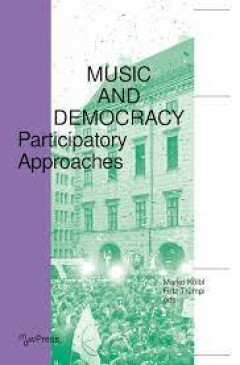
Music and Democracy Participatory Approaches
Music and Democracy explores music as a resource for societal transformation processes. This book provides recent insights into how individuals and groups used and still use music to achieve social, cultural, and political participation and bring about social change. The contributors present outstanding perspectives on the topic: From the promise and myth of democratization through music techno…
- Edition
- -
- ISBN/ISSN
- 9783839456576
- Collation
- -
- Series Title
- -
- Call Number
- -

Our Civilizing Mission : The Lessons of Colonial Education
Our Civilizing Mission is at once an exploration of colonial education and a response to current anxieties about the historical and conceptual foundations of the ‘humanities’. On the one hand, it treats colonial education as a facet of colonialism. It draws on a rich body of work by ‘colonized’ writers – starting with Edward Said, then focusing on Algeria – that attests to the suffe…
- Edition
- -
- ISBN/ISSN
- 9781786941763
- Collation
- -
- Series Title
- Contemporary French and Francophone Cultures
- Call Number
- 370 HAR o

Taking Sides: Theories, Practices, and Cultures of Participation in Dissent
Is there an option to oppose without automatically participating in the opposed? This volume explores different perspectives on dissent, understanding practices, cultures, and theories of resistance, dispute, and opposition as inherently participative. It discusses aspects of the body as a political instance, the identity and subjectivity building of individuals and groups, (micro-)practices of…
- Edition
- -
- ISBN/ISSN
- 9783839449011
- Collation
- -
- Series Title
- -
- Call Number
- 306.768 TAK t
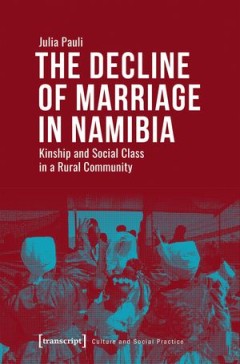
The Decline of Marriage in Namibia: Kinship and Social Class in a Rural Commu…
In Southern Africa, marriage used to be widespread and common. However, over the past decades marriage rates have declined significantly. Julia Pauli explores the meaning of marriage when only few marry. Although marriage rates have dropped sharply, the value of weddings and marriages has not. To marry has become an indicator of upper-class status that less affluent people aspire to. Using the …
- Edition
- -
- ISBN/ISSN
- 9783839443033
- Collation
- -
- Series Title
- -
- Call Number
- 301 PAU d

Science at the end of empire
This book produces a major rethinking of the history of development after 1940 through an exploration of Britain’s ambitions for industrialisation in its Caribbean colonies. Industrial development is a neglected topic in histories of the British Colonial Empire, and we know very little of plans for Britain’s Caribbean colonies in general in the late colonial period, despite the role played …
- Edition
- -
- ISBN/ISSN
- 9781526131409
- Collation
- -
- Series Title
- -
- Call Number
- -
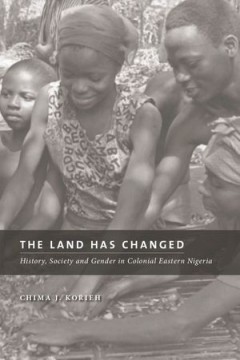
The Land Has Changed History, Society, and Gender in Colonial Nigeria
A century ago, agriculture was the dominant economic sector in much of Africa. By the 1990s, however, African farmers had declining incomes and were worse off, on average, than those who did not farm. Colonial policies, subsequent ‘top-down’ statism, and globalization are usually cited as primary causes of this long-term decline. In this unprecedented study of the Igbo region of southeaster…
- Edition
- -
- ISBN/ISSN
- 9781552385456
- Collation
- -
- Series Title
- -
- Call Number
- -
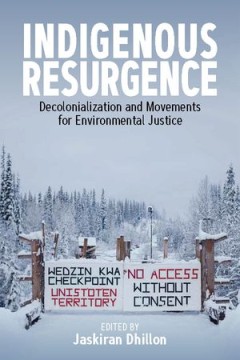
Indigenous Resurgence
From the Standing Rock Sioux Tribe’s resistance against the Dakota Access pipeline to the Nepalese Newar community’s protest of the Fast Track Road Project, Indigenous peoples around the world are standing up and speaking out against global capitalism to protect the land, water, and air. By reminding us of the fundamental importance of placing Indigenous politics, histories, and ontologies …
- Edition
- -
- ISBN/ISSN
- 9781800732452
- Collation
- -
- Series Title
- -
- Call Number
- -
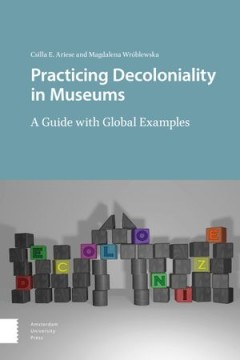
Practicing Decoloniality in Museums: A Guide with Global Examples
The cry for decolonization has echoed throughout the museum world. Although perhaps most audibly heard in the case of ethnographic museums, many different types of museums have felt the need to engage in decolonial practices. Amidst those who have argued that an institution as deeply colonial as the museum cannot truly be decolonized, museum staff and museologists have been approaching the issu…
- Edition
- -
- ISBN/ISSN
- 9789048554836
- Collation
- -
- Series Title
- -
- Call Number
- 708 ARI p
 Computer Science, Information & General Works
Computer Science, Information & General Works  Philosophy & Psychology
Philosophy & Psychology  Religion
Religion  Social Sciences
Social Sciences  Language
Language  Pure Science
Pure Science  Applied Sciences
Applied Sciences  Art & Recreation
Art & Recreation  Literature
Literature  History & Geography
History & Geography